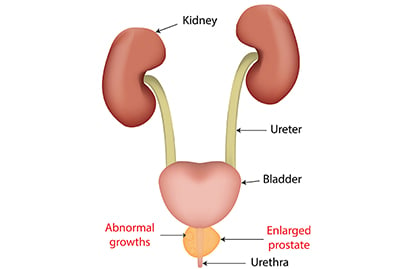Benign prostatic hyperplasia (BPH) is the medical terminology to describe a nonmalignant enlargement of the prostate gland common in older males, which can lead to obstructive lower urinary tract symptoms.

A large number of males over age 40 end up experiencing signs of benign prostatic hyperplasia (BPH), or an enlarged prostate. It is estimated that about 50% of males have significantly enlarged prostates by age 60 and 80% by age 90. Symptoms of BPH may include:
So, what could be influencing all these men’s prostates to enlarge in such a way? Well, we know of patterns in what is common in those individuals who do and don’t have BPH. Genetics is one factor, but having the following medical problems are strongly associated with a higher risk of developing BPH:1
The above factors likely lead to inflammation, oxidative stress, nutrient deficiencies, and hormonal changes that are thought to influence prostate tissue abnormally, leading to BPH. A Nutritarian lifestyle dramatically reduces the risk of heart disease, obesity, and diabetes and fulfills the nutrient requirements of a healthy prostate while lowering inflammation and oxidative stress. The younger you begin changing your lifestyle, the better the protection against BPH. The high sweet and meat dietary pattern raising IGF-1 (insulin-like growth factor-1) is a primary driver of both age-related prostate enlargement and prostate cancer.2, 3
A Nutritarian eating style is ideal for reducing the risk factors associated with getting an enlarged prostate, or benign prostatic hyperplasia (BPH), such as:
Bright colored vegetables and fruits (dark green leafy vegetables, tomatoes, watermelon, carrots, etc.), nuts, and seeds are all rich in the nutrients that help maintain a normal healthy prostate and should be eaten every day.
ONLINE: All members of DrFuhrman.com can search the Ask the Doctor archives for discussions on this topic. Platinum and Diamond members can connect with Dr. Fuhrman by posting questions in the forum. Not a member? Join now.
IN PERSON: Book a stay at Dr. Fuhrman’s Eat to Live Retreat in Southern California. With options ranging from one, two and three months (and sometimes longer) you will be under Dr. Fuhrman’s direct medical supervision as you hit the “reset” button on your health. For more information: (949) 432-6295 or [email protected].
EVENTS: Join Dr. Fuhrman for an online boot camp, detox or other event. During these immersive online events, you’ll attend zoom lectures, follow a special meal plan, and have access to a special, live Q&A session with Dr. Fuhrman. Learn more about events.
The following are sample questions from the Ask the Doctor Community Platinum and higher members can post their health questions directly to Dr. Fuhrman. (All members can browse questions and answers.)
My husband was told by his doctor recently that his prostate was enlarged. The doctor said it was normal for older men. His PSA tests were all fine. What are your thoughts on this?
My thoughts are that this is true and nothing to be concerned about. In studies, it has been shown that doctors are notoriously inaccurate at estimating the size of a man’s prostate by doing a rectal exam and touching the top of the prostate. In other words, whatever the doctor said is almost meaningless, and if his PSA is normal that further supports that the doctor’s statement was irrelevant.
Is there any way to decrease an enlarged prostate without prescription medication? Would a Nutritarian diet help?
I have not really seen the diet work effectively for this once symptomatic enlargement is present. Living healthfully and a lower protein diet all through early life can prevent it though.
In general, the protocol for prostate health includes a vegan or flexitarian Nutritarian diet with lots of cooked tomatoes, beans, cruciferous greens, mushrooms, pomegranate, berries, and seeds. Also, cruciferous juicing is beneficial.